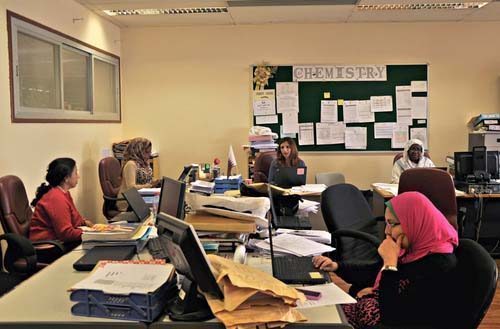
By Aamena Ahmed
Noor Al-Dirhem still vividly remembers her first days as a teacher at Al-Aqsa Independent School. Standing in front of a crowded classroom, equipped with the latest technology, she presented a lesson from one of the most advanced British curriculums. But 20 pairs of eyes stared blankly at her. She felt useless, she said.
“I lost many things as a teacher – my independence in class, my independence in work, and especially using my own mind in teaching,” Al-Dirhem, a Qatari, added. “I just couldn’t live that way.”
For two years, the educator worked as a teacher at both preparatory and secondary independent schools, which are government-funded. But she said the jobs were an uphill, exhausting battle because students wouldn’t listen, coordinators wouldn’t cooperate and the school system was a mess.
Al-Dirhem quit her job as a teacher last year and now works for the Supreme Education Council as an education specialist for private schools.
Across Qatar, many teachers like her have given up on independent schools.
Shortage of qualified teachers
The result: a huge shortage of qualified educators, and the subsequent hiring inexperienced teachers.
“At the end of the day, schools need teachers in those classrooms,” said Patricia Kerr, an assistant professor of educational sciences at Qatar University who also works closely with teachers in training workshops.
“They come into the classroom without the education or training,” she said. “Some have never taught before in any way, shape or form.”
One of the second-grade science classes at an independent school in Dukhan doesn’t have a teacher. The students occupy their seats and loud chatter fills the classrooms, but the teacher’s desk remains empty. A school coordinator enters the class and starts teaching the day’s lesson, but the clamor continues.
“At some point, we have to start appointing teachers that don’t meet the standards,” said Fatma Becetti, the academic vice principal at the school, which she asked not be named. “We don’t have another choice.”
Corporal punishment
Becetti also mentioned that many teachers at independent schools come from other nations where disciplining students may come in the form of physical punishment, which is not acceptable in Qatar.
“We have to start from scratch and teach them everything – what to say, what not to say to students, how to behave with parents,” Becetti said. “These things should be common sense, but we end up having to teach them this stuff.”
After the Supreme Education Council implemented major educational reforms in 2008, teachers were expected to do things they had never done before. For the first time, they were expected to write lesson plans and clearly identify class objectives, Kerr said.
As a doctorate degree-holding and experienced Indian teacher at Al-Bayan Independent School, Kamini Kohli has observed many new teachers over the past seven years.
“When I interact with certain teachers, it becomes apparent many don’t know what they are doing,” said Kohli, a 12th-grade chemistry teacher at the school. “That’s the reality.”
She also disagrees with the recent switch to fixed salaries for all teachers. In the latest report on schools in Qatar released by the Supreme Education Council last year, 71 percent of teachers indicated they were dissatisfied with their monthly salary.
“This is totally illogical,” Kohli said. “It doesn’t give an incentive for educated and experienced teachers to continue working.”
Financial concerns
Karam Al-Qassab, an Iraqi pediatric consultant and mother of four children, said only her eldest daughter graduated from an independent school here. The rest of the kids are enrolled in private schools.
“I’ve seen the homework my eldest daughter used to receive (at Al-Bayan Independent School) and the one my younger daughter now receives at Qatar International School,” Al-Qassab said. “There is a huge difference in the material that is covered and the way it is taught. It’s much deeper, wider and demands higher standards.”
For most families, the ultimate decision of which school to send their child to boils down to finances, Al-Qassab added.
“If all parents could afford to send their kids to good private schools, independent schools would have a hard time surviving,” she said.
According to a 2012 report conducted by the Social and Economic Survey Research Institute at Qatar University, nearly 50 percent of students at independent schools depend on tutors. Students are passing exam after exam and receiving diplomas, but they are not actually learning or trying to understand the material, Al-Dirhem said.
“Respect from students is completely gone,” Al-Dirhem said. “Not just respect towards the teacher, but also respect for acquiring knowledge.”
Al-Dirhem believes that teaching is a beautiful thing to do, but people have diminished that idea. Qatar doesn’t need big fancy schools or the latest equipment in classrooms. It just needs good teachers who are appreciated for the work they do, she said.
Thoughts?
Credit: Photo by Aamena Ahmed







